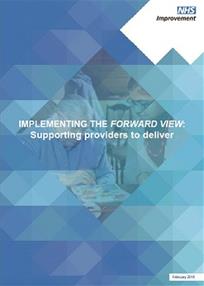News / NHS Improvement targets return to earned autonomy
 Monitor and the NHS Trust Development Authority will merge formally on 1 April to form the new regulator. Setting out its plans, NHS Improvement said the scale of the financial and operational problems faced by providers means it will have greater involvement with them in the short term.
Monitor and the NHS Trust Development Authority will merge formally on 1 April to form the new regulator. Setting out its plans, NHS Improvement said the scale of the financial and operational problems faced by providers means it will have greater involvement with them in the short term.
However, it said such an approach had limitations and in the longer term it wished to develop an oversight model that would seek first to support organisations to improve, intervening only when it had to.
While the plan is largely about the implementation of the five-year view, it also recognises the importance of more recent developments, such as the Carter review, in trust operation over the next five years.
Much like the Carter model hospital single version of the truth, NHS Improvement said it would work with the Care Quality Commission and NHS England to create a single simple definition of success for providers. This would cover finance and use of resources, quality, operational performance, leadership and strategic change.
The finance/use of resources element would include the new use of resources assessment being developed with the CQC and reflect Carter’s recommendations on metrics.
Beyond the plans for a short-term grip on providers’ finances and operational performance, there would be a return to earned autonomy. Successful providers would be allowed greater freedoms, including a relaxation of restraints on decision-making, fewer data and monitoring requirements and simpler processes for transactions.
However, those with the biggest challenges – foundation trusts in breach of their licence, for example – will be given ‘more directive support’.
NHS Improvement chief executive designate Jim Mackey said: ‘NHS Improvement will stand shoulder-to-shoulder with the service, whether that is in getting a grip on the financial situation or providing stability and offering support as our NHS seeks to change and improve to meet the needs of its patients.
‘Clinical expertise will be at the heart of our work. That’s why we’re setting up an Improvement Faculty to advise and lead the creation of an “improvement movement” across the NHS.’Related content
The Institute’s annual costing conference provides the NHS with the latest developments and guidance in NHS costing.
The value masterclass shares examples of organisations and systems that have pursued a value-driven approach and the results they have achieved.